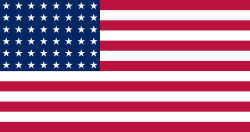This article needs additional citations for verification .(December 2009) |
| United States at the 1928 Summer Olympics | |
|---|---|
 | |
| IOC code | USA |
| NOC | United States Olympic Committee |
| in Amsterdam | |
| Competitors | 280 in 15 sports |
| Flag bearer | Bud Houser |
| Medals Ranked 1st |
|
| Summer Olympics appearances (overview) | |
| Other related appearances | |
| 1906 Intercalated Games | |
The United States competed at the 1928 Summer Olympics in Amsterdam, Netherlands. 280 competitors, 236 men and 44 women, took part in 96 events in 15 sports. [1]
